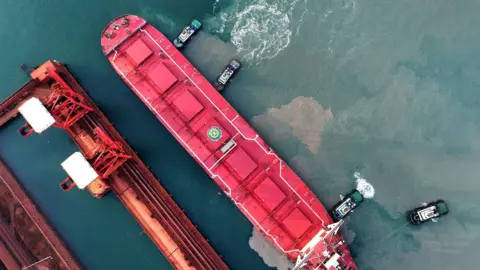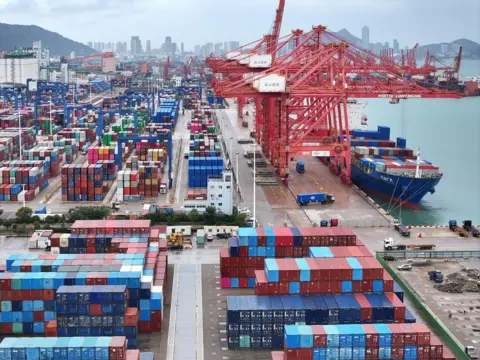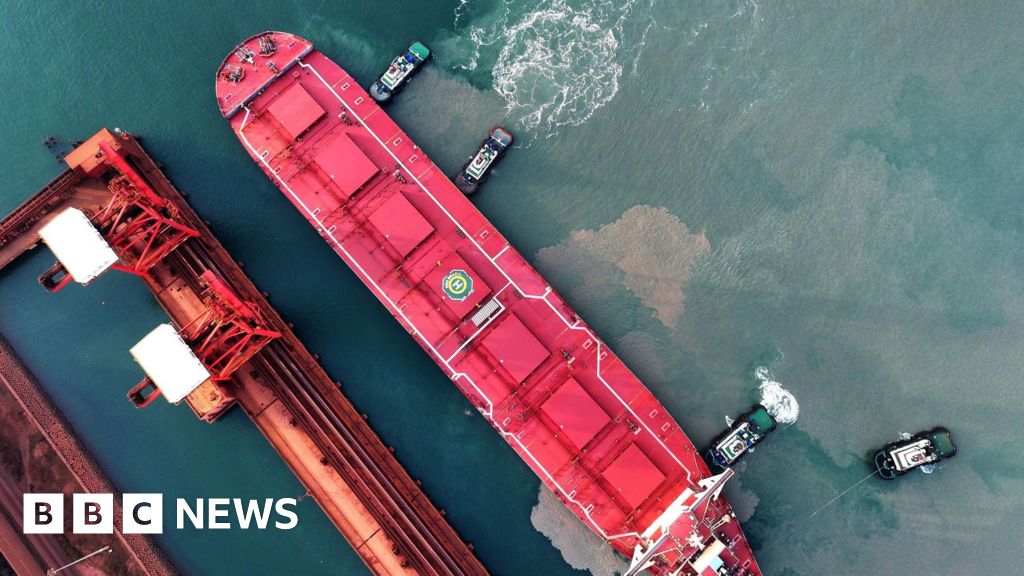Climate and Science correspondent
 Costfoto/Nurphoto/Getty Images
Costfoto/Nurphoto/Getty ImagesCountries have agreed to a global deal to address shipping emissions, after nearly ten years of negotiations.
The agreement is covered by the vast majority of commercial shipping in the world and means that starting in 2028, ship owners will have to use the increasingly clean fuel or face fines.
The deal was almost merged after the Kingdom of Saudi Arabia forced a vote at the last minute and the United States withdrew from the talks in London – but it finally passed on Friday.
The small island countries and environmental groups were angry at the lack of agreement on a comprehensive tax and called the deal “inappropriate for the purpose.”
Shipping accounts for About 3 % of global emissions. But unlike many other sectors, it has struggled to reduce carbon imprint over the past decade and depends on fossil fuels such as diesel.
But the agreement means that it is now the first industry in the world with internationally delegated goals to reduce emissions.
The agreement was approved at the United Nations International Maritime Organization (IMO) meeting.
It will require large international ships owners to increase their use of carbon -less carbon fuel or face a penalty of $ 380 per ton of carbon dioxide emissions from which it emites from burning fuel.
Despite the approval of the final agreement, it should have been placed in the vote – an unusual step for United Nations bodies that usually agree to measures according to consensus.
Voting request by the Kingdom of Saudi Arabia, which did not support the agreement, and this position has shared dozens of other oil -producing countries, including Russia.
Although they opposed the proposal, they will be obligated to implement it because they are members of IMO.
There were moves to improve ship efficiency, but emissions continued to increase in line with global trade – 90 % of which were carried by ships.
The most effective procedure will be to switch ships away from fossil fuels to green fuel, but this will be very expensive.
“There is no cheap fuel like diesel that ships use today because when we take off the crude oil from the ground, we take out all the gentle parts, and this is the Kirosin Air, diesel and gasoline for cars,” said Fig Abbasov, director of the maritime transport program in transporting tanks in the field of transport and environment.
“All that remains on the bottom, this is what the ships burn. So any fuel will be cheap like this because there is not much energy in its production,” he said.
In comparison, the most environmentally friendly fuel such as E-Cerosen and Ammonia from water atoms initially to obtain hydrogen, which is a thick process of energy and very expensive.
The numbers differ depending on the type of fuel, however Global Economic Forum estimates This green fuel is 3-4 times more to be produced.
“There is still a huge cost gap between fossil fuel and zero emissions and we need to bridge this gap. So you need carrots and sticks, and in shipping the stick, it is not large until you use sustainable fuel,” said Refke Gunnewijk, Director of the Sustainable Transport Program at Rotterdam Port.
 Reuters
ReutersSome of the states were also humiliated and said that the deal was a reduced version of what they were hoping. A previous proposal to apply comprehensive carbon tax or carbon tax – which would have been the world first – was dropped.
“Let’s be clear about those who abandoned 1.5 degrees Celsius, the US allies and fossil fuels have declined numbers to a level that cannot be defended and prohibited progress at each turn,” said Ralph Regenvano, Minister of Energy and Climate Change for Vanuato.
The disappointment of their hope was shared by environmental groups.
“This week, the member states of the International Maritime Organization were missing a golden opportunity for the global shipping sector to show the world how the tide can manage the catastrophic climate and set its own goals away,” said Delain McColeo, head of the clean shipping alliance.
It is estimated that the agreement can achieve a 8 % decrease in emissions for the sector by 2030, according to UMAS. This will be less than the IMO goal that was agreed two years ago to reduce emissions by 20 % by the end of the contract.
But China and Brazil have previously raised fears that the tax could lead to a significant increase in prices for basic commodities such as food. Both countries support the final deal.
Jesse Fenestock, director of carbon removal operations at the World Maritime Forum, said the deal was a compromise.
“It is a difficult set of decisions, but it is the first list of its kind that must be celebrated,” he said.
Fahnestock added that it is unclear whether the sanctions are sufficient to fill the cost gap between the fuel.
“You may have the owners of the museum ships to prepare a little future fuel, but whether the signal is strong enough to get billions of dollars from investing in production facilities for this fuel – I don’t think these regulations will overcome this. I think more will need to do.”
Any money collected from the sanctions will be placed in the “Safi zero” fund, with money spending on expanding the scope of the most green fuel and supporting developing countries.
It is the “redistribution” that prompted the American delegation to withdraw from the talks on Tuesday night. A letter was sent by the United States to all countries in IMO negotiations, saying that any tax may cause inflation, and if passed, “mutual measures” will be taken.
Although the American move was at odds with its long position in IMO, it was in line with President Trump’s push for the climatic measures that were seen during the past few months – such as withdrawing the United States from the Paris Climate Agreement.
However, industry and country representatives appeared unusive when speaking to BBC on Wednesday and continued negotiations.
The United States has declared only 178 shipping ships, which represent 0.57 % of the commercial shipping load around the world. So if it takes a decision not to implement new proposals, it is unlikely to make a big difference in the collected money.
Now the committee agreed to this procedure, which is expected to be officially approved in October.


